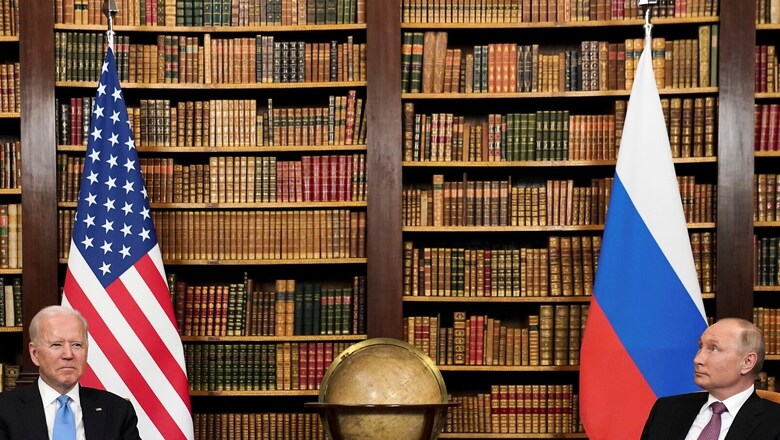
views
The sharpening acrimony between Russia and the West is nothing short of a nightmare for the Indian foreign office mandarins, particularly with the dragon breathing down our neck all along the long Line of Actual Control (LAC). It could complicate India’s geopolitical environment, narrow her options, weaken QUAD, tighten the Russian embrace of China, possibly strain New Delhi’s equation with Moscow and stiffen American positions in ongoing negotiations on various issues with India.
Given Chinese aggression and ambition to eclipse the US at least in the Asian region, the natural thing for the West should have been to draw Russia into its orbit and concentrate on pushing China back. This approach was successfully test-driven during the Cold War when China was weaned away from the USSR. Moscow no longer poses realistic security or strategic threat to the Western interests, yet NATO has been steadily creeping closer to the Russian borders while professing peaceful intent.
It would have been naive to expect President Putin to sit idle. Since the Russian takeover of Crimea in 2014, a cycle of measures and countermeasures have unfolded, which does not augur well for global peace and stability. It may be recalled that President Khrushchev had gifted Russian Crimea to Ukraine to strengthen fraternal ties in 1954, during the heydays of the USSR.
The frank and timely meeting last June in Geneva between Biden and Putin had kindled hope for a thaw in the ties. As if that was not palatable to certain interest groups, things dramatically took a turn for the worse. The western media gleefully started drumming up anti-Russia hysteria. We are told that a Russian invasion of Ukraine is imminent. Washington is threatening severe consequences including personal sanctions on President Putin.
Seeds of Discord
The seeds of discord were sown by none other than the US, according to former chairman of Chairman of the National Security Advisory Board Ambassador P.S. Raghavan, when President Bush prevailed upon NATO at the Bucharest summit in 2008 to open its doors to Ukraine and Georgia, much to the chagrin of Paris and Berlin. Moscow’s redline had been crossed. The message was loud and clear; the Cold War may have ended but the Western containment strategy of Russia had not. Old habits indeed die hard!
The NATO approach raises many questions. First, is there enough justification for a NATO-like military alliance any longer? Two, can West European security interests be enhanced by ignoring those of Russia? Three, though no longer a superpower, is Russia realistically expected not to secure its flanks? Four, having ignited Ukrainian expectations, the West now maintains that Kyiv’s membership of NATO or the European Union is not imminent. This is cold comfort for Moscow as it merely delays the inevitable, especially since Ukraine was made an enhanced opportunity partner in 2020. This special status is meant for NATO’s closest allies.
Russia, Ukraine and Belarus, all Slavic nations are known as ТриСестры – or Three Sisters. They enjoy close historical, cultural and linguistic bonds. Over 17 per cent or some 8 million people in Ukraine are of Russian origin, concentrated in the east and south. They have pro-Moscow leanings which are exploited by Russia.
In any event, Russia is loath to see Ukraine spinning out of its orbit. According to the US Council on Foreign Relations, despite Ukrainian President Volodymyr Zelensky’s strong bid for NATO and EU membership, recent polls indicate that “just 40 to 50 per cent Ukrainians are in favour of joining NATO” while more than half want EU membership.
Meanwhile, the US (and Europe) has upped the supply of lethal weaponry to Ukraine, which Secretary Blinken ‘helpfully’ calls defensive military equipment. NATO has enhanced its naval presence in the Black Sea. More troops, also American, are being positioned in East European countries. ‘Experts’ of all hues are busy second-guessing Moscow and conjuring different invasion scenarios. The upcoming joint military exercise “Allied Resolve” from February 10-20, between Russia and Belarus, is being projected as ‘Mission rehearsal’ even though it is a regular feature.
Simultaneously strategic stability talks are being held between Russia and the US as also between Russia and NATO. Russia has sought certain security guarantees that the West is unlikely to provide. The US has made some counter-proposals which Russia is considering, but has categorically declined to provide assurance that Ukraine will not be inducted into NATO. It is contended that Ukraine’s sovereign right to choose has to be respected. The argument would have been persuasive but for the open secret that the West has been orchestrating colour-revolutions in the former Soviet republics to overthrow pro-Moscow regimes.
A Tightrope Walk for India
As all sides continue to engage in brinkmanship, Ukraine has been reduced to a sacrificial lamb. The Doomsday Clock has been set at 100 seconds to midnight, signifying an extremely dangerous juncture for mankind. The battle lines have been drawn up. Expectedly China has come out openly on the Russian side. Washington, which just refuses to learn from past missteps, is leading the charge against Moscow.
The US had exited from Afghanistan avowedly to concentrate on addressing pressing internal issues and the China threat, which is real and growing. But that seems to have been forgotten. Former Defence Secretary Robert Gates has described Joe Biden as a decent man who has “been wrong on nearly every major foreign policy and national security issue over the past four decades.”
Though Secretary Blinken claims unprecedented coordination with European allies, the latter remains a divided house. Paris and Berlin have little appetite for conflict, while a beleaguered Boris Johnson appears to be praying for one.
In any event, since Kyiv is not a member of NATO or EU, the Western allies are highly unlikely to deploy boots on the ground if hostilities indeed breakout. They would rely instead on extending diplomatic, material and military support. The threat of severest of sanctions is also being brandied. It is estimated that the existing sanctions since 2014 have retarded Russian GDP growth by 1 per cent.
The next couple of months would be crucial and India would have to continue walking the tightrope. After deliberating over the developments closely, the Ministry of External Affairs has called for a “peaceful resolution of the situation through sustained diplomatic efforts for long-term peace and stability in the region and beyond”. India is in a bind as she cannot afford to displease either side. Yet neutrality can work only to an extent. New Delhi’s diplomacy will be sorely tested if confronted with a ‘you are either with us or against us’ moment in the event of hostilities flaring up.
Will the US sleepwalk into another conflict or pull back from the brink is uncertain. One can only hope that German philosopher Nietzsche’s observation – ‘Insanity in individuals is the exception, but in countries, it is the rule’ – does not get validated yet again.
The author is Former Envoy to South Korea and Canada and Official Spokesperson to the Ministry of External Affairs. The views expressed in this article are those of the author and do not represent the stand of this publication.
Read all the Latest Opinions here


















Comments
0 comment